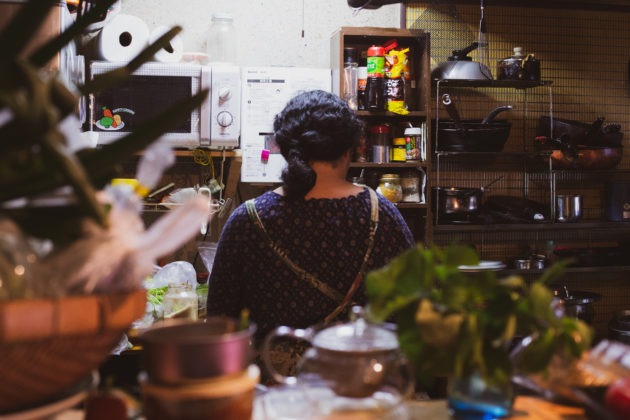
Monpan Shokudo is a homey and creative restaurant in Kyoto serving Mongoru Pan—Mongolian bread—alongside fusion recipes from around the world. There’s a particular character about Monpan, one that is difficult to describe, but that emerges through the life story of its co-owner, Haruhisa Kato. In this conversation, Haru takes KJ’s Ananya Mayukha through the journey that led to Monpan, from her childhood days in Nara to her former life as an architect-come-musician to the time when she met her life partner and co-owner of the restaurant, Akki.
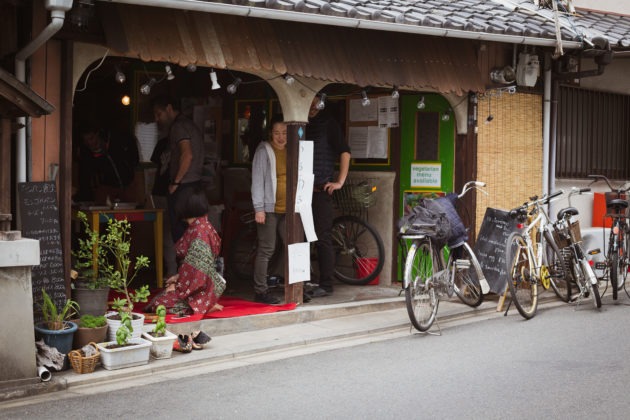
Haru: You’re planning to introduce Monpan to Japan?
Ananya: Everybody knows Monpan.
Not everybody. Only people who know Monpan…know Monpan.
Can you tell me a bit about your childhood?
I was born in Osaka and brought up in Yoshino, in Nara prefecture. My mother died when I was 7 years old, and I was her only child. My father was a taxi driver, and in the summer vacations, I was forced to go to my grandfather’s place, also in Nara. It’s a very mountainous place—beautiful mountains and a crystal clear river that runs through the mountains. My grandfather was such a nice man. He was so old, but he knew how to make everything from scratch. For example, the shoes made from straw—草鞋 (waraji), as we call it.
Once he told me, “tomorrow we are going to climb the mountain in the morning, so you have to get up very early, at 5 o’ clock.” But he woke up even earlier, at 3 o’clock, and he started to make straw shoes. From scratch. That’s the kind of person he was.
My grandfather died when I was 17. He was my hero.
Back home with my father and stepmother, I was kind of shut in. You understand?
Shut in?
Shut in the house. I couldn’t go out, because of my heart disease, or heart…something.
I was against my stepmother. She forced me to believe in religion—her religion, a “new born” religion, so I was against her for a long time, and finally I couldn’t go to school. That was when I was 15—I couldn’t go to school, and for 3 years I was confined to the house.
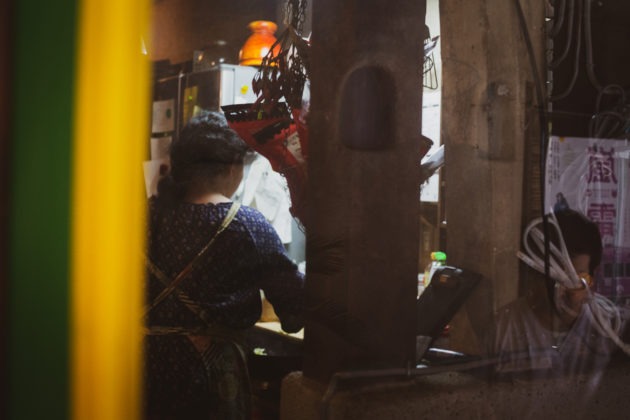
You were just kept in the house?
No, no, no. I wasn’t captured. It was my heart. I was afraid of stepping outside into society, you know? So I stayed in the house, but even in the house, my stepmother was not my friend. She forced me to believe in her religion, and I was against it. So I didn’t go to school, and I struggled for a long time, but I studied by myself and got into university. Then I got out of the house and started to live on my own.
At that time, many of my friends had been to India, and they told me that India was very wonderful. So I worked very hard to get some money, and I went to India for the first time when I was 19 years old.
I remember you telling me once—you found things in India that you couldn’t find in Japan?
Yes, in India, I found that the people were just living for life. Living for working. Sometimes, they cheated others, but they were struggling for life. And even though many people were so poor, they were still working very hard to get better conditions.
When I saw that, I could understand that even in Japan, people were the same. They were working for the company but not only for the company. They were working for their family—working to support their father and mother…the same thing! Same thing, but at that time, I didn’t know it was the same.
After graduation, all the University students wanted to get into what was called a “good company,” to get a lot of money. I didn’t want that. I just wanted to live…real my life. At least, that’s what I thought at that time.
After graduation, I taught English for six years in a high school, but then I quit and went to a second university to study architecture. I was interested in architecture, because I liked the life of the people. I liked houses and I liked cooking as well. Life itself I liked.
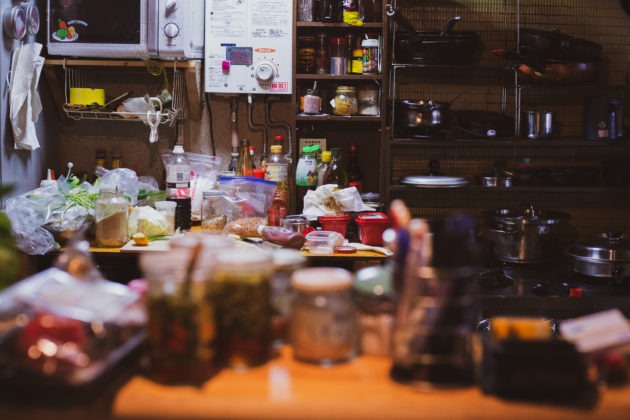
After graduating from the architecture university, I started doing interior construction work. My coworkers played in a band together, and they asked me to join the band. So we did construction work on the weekdays, and played as a band over the weekend. We worked together for 15 years like this, and we also went on tour to many parts of Japan. Sometimes we joined music festivals, which lasted ten days. We’d pitch a tent and play music. But we got so little money from these performances, that eventually, we couldn’t even pay for transportation. So I hit upon a plan to sell something. First, we sold curry and rice. But that was very common—everybody sold curry and rice. So I hit upon another plan.
While traveling with my band, I made many friends at many many places all over Japan. One of these friends was from Mongolia. When the southern part of Mongolia was captured by China, he got out of there and came to Japan, and started running a Mongolian restaurant. Then, when there was the big earthquake in Kobe 20 years ago, 6000 people were killed and many houses were broken, and the Mongolian government sent the…you know ger? Mobile houses.
What are they called?
They’re called ger—houses for people in Mongolia who keep sheep. The Mongolian people sent these mobile houses to Kobe for people who lost their houses after the earthquake. But the Japanese government didn’t know how to set up the ger, so they left them sitting for many years, and they rotted. When I heard about this, I felt very sorry for the Mongolian people, and I felt I had to do something for them. So my plan was to hold an event. At that time, I was living in Ibaraki near Kyoto, and I set up a Mongolian mobile house along the river, which I made by myself with bamboo. I invited many of my friends from Mongolia who were living in Osaka at that time, and also my musician friends, some from Osaka and some from India as well. Over 100 people came to that party. And that’s when our Mongolian friend taught me how to make Mongolian bread.
Later, I went to his restaurant, and he taught me again how to make the dough. And then five years later, I got the idea to start selling it too. I thought that if I made something like a hamburger or tacos with the Mongolian bread, I could make better profit than I did with just curry and rice. So I experimented with that, and finally came to the style we sell now, and it worked. We sold many every time, and we could pay for the transportation fee to play at the festivals. And that lasted maybe 10 years or so, and finally, she [Akki] came, and I quit the band and started to sell Monguru pan with her for another 10 years. And then we thought we’d better have a restaurant or something. A real one. So we made this restaurant. Constructed it ourselves.
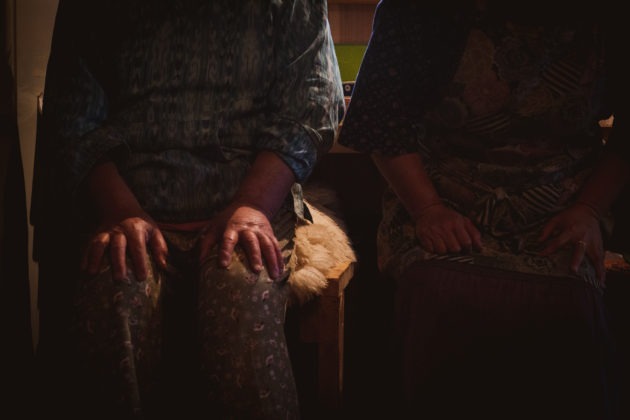
Its really striking to me how much you use your hands—to build, to cook, to play music…
I like drawing as well. These are my drawings! [Shows drawings] And this also! This is a diary from when I was traveling. This is Italy, Greece, Guatemala, Peru, Turkey.
Why did you travel to all these places?
I was interested in culture. Now I can enjoy the Japanese culture, too. But when I was young, I was not interested in Japanese culture. Well really, I didn’t know anything about Japanese culture at that time.
Why not?
Why not? I don’t know, maybe at that time I was…why not?? I don’t know. I think young people don’t know anything about their own culture. I listened to western music and watched the American movies, and everything Japanese looked very shabby to me at that time. Now I feel very different.
When did you start to learn about Japanese culture?
After I visited many countries, maybe. There are so many good cultures, good people, good lives. But I realized—even Japan is one of those countries. So I returned to Japan, and I knew. Everything around us was good. Everything Japanese was nice. That’s the way I felt.
And what is the story of how you met Akki-san?
I started to sell Monpan at the music festivals in 1999, and I met her in 2000 at an event called ‘Walk.’ Just ‘Walk.’
It was a walk from Tokyo to Hiroshima and Nagasaki, where the atomic bomb was dropped in 1945 and over 50,000 people were killed.
The atomic bomb was made from uranium, which the American government mined on reservations of the Hopi tribe. Hopi means “peaceful”—and the Hopi people loved peace very much. There is even a saying: if a goat packed with ashes falls from the sky, tell the world the Hopi stories. While we were walking, we held a burning fire, and after walking to Nagasaki, some people continued on to the Hopi reservation in the United States, to return the fire there.
I walked about 120 kms of the way, starting from Kyoto. I met her [Akki] in Kobe, and we walked together.
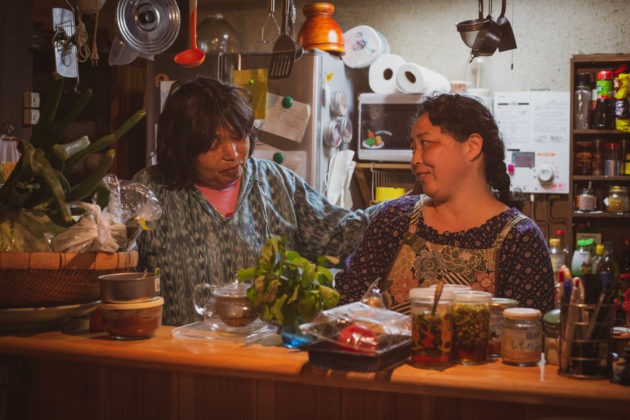
You walked together, side by side?
No no no. With many people. Over 60 people.
I’m making the story more romantic.
Yes, it was not so romantic.
Anyway, she was from Nagasaki. After the walk, she made a phone call to tell me that she wanted to meet me again, so I invited her to my house.
Your house near Kyoto? So she came all the way?
All the way. So it was a long distance love.
And then after two or three years, she came to Kobe. She was attending acupuncture school, and after graduation she came to Kobe as an acupuncturist. After she came to Kobe, we met once a week or so, on her day off. After that, she came to my house, and we lived together, and so on. And we started to sell Mongoru Pan together three years later.
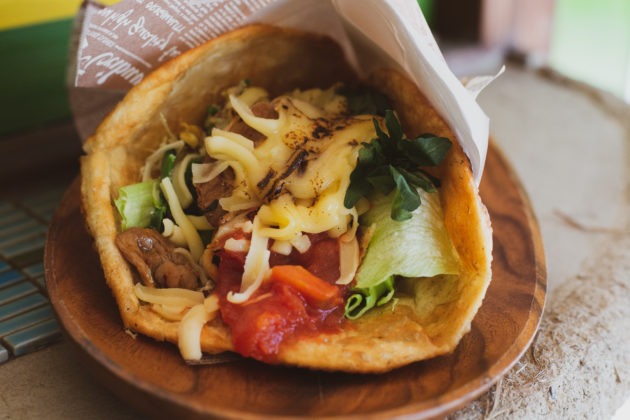
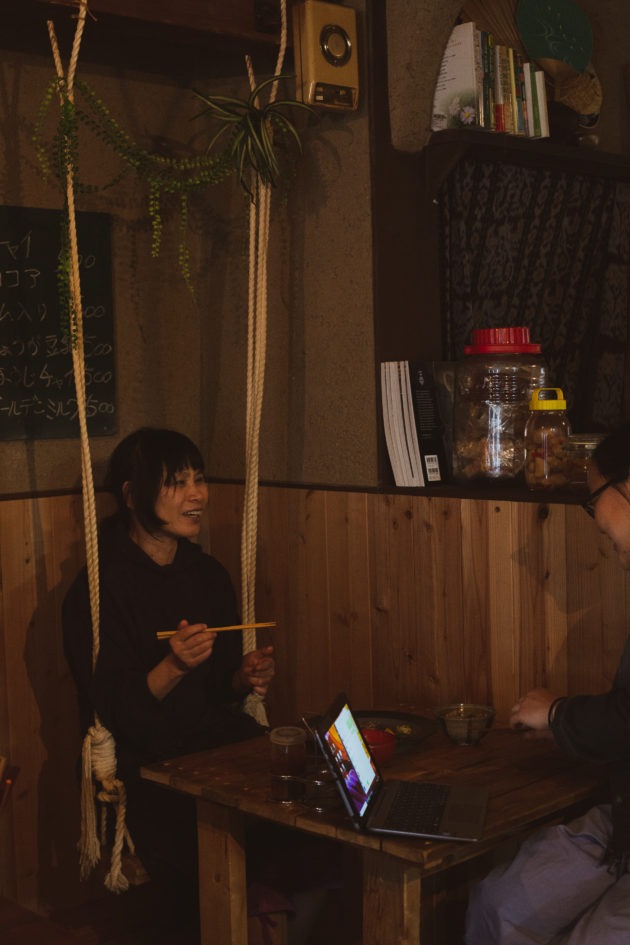
You started selling Mongoru Pan at the festivals, right? Did that feel different from the way it feels to sell it now, in a restaurant?
The people eating it were different. In this restaurant, people are relaxed and eating Mongoru Pan very slowly. But at the festivals, people would eat Mongoru Pan while walking or dancing, with a glass of beer in the other hand.
I like festivals very much.
What do you like about them?
Music is always in my ear, and there is so much happiness in the field. Especially in summer time, in the mountains or near the sea. The feeling is very good.
So what was the reason for building this restaurant?
Sometimes, when we wanted to sell food outside, we were told we couldn’t. In the festival it was okay, but even in the festival, we were forced to fill out paperwork, that kind of thing. If we had the restaurant, we could sell food outside without any problem. That’s the reason we made the restaurant.
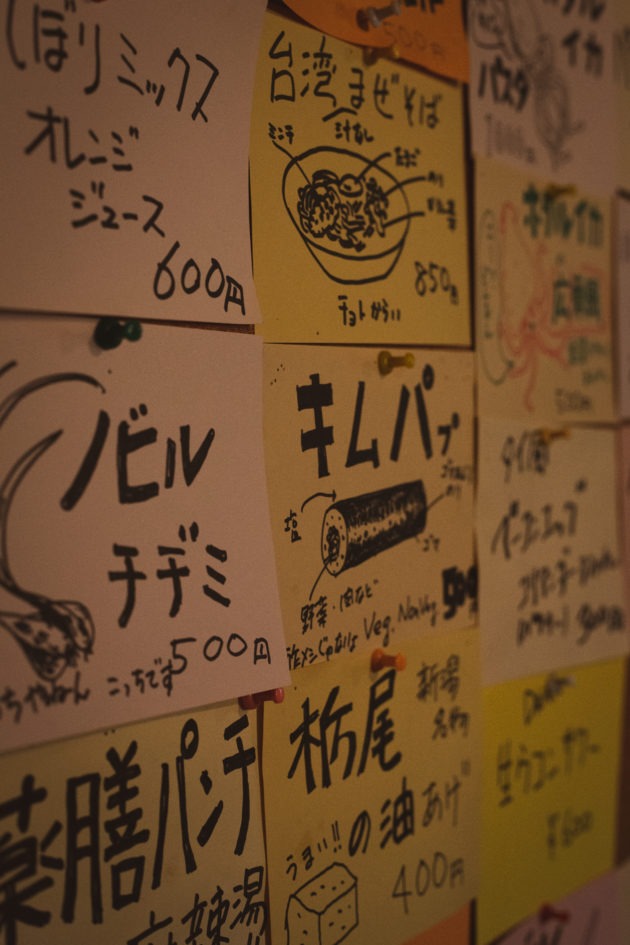
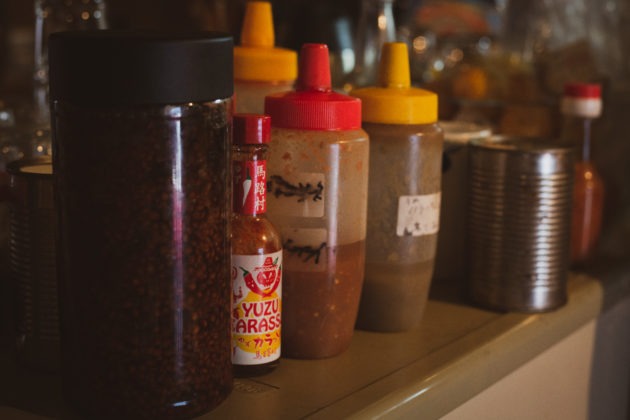
And now you make many other dishes, too, right? In addition to the Mongoru Pan.
Yes, from the Asian cuisine. I was not trained professionally, so sometimes I felt it was quite difficult to make traditional Japanese food. But I knew that I ate the Japanese food for many years, so I could reproduce it. And, after traveling to many places in the world, I wanted to make a new Japanese cuisine.
A new Japanese cuisine? What do you mean?
It’s not exactly the traditional cuisine, but I add something new to the traditional one. Sometimes, I put new spices on a Japanese dish. So I don’t mean that I serve you the traditional Thai cuisine or traditional Indian food, not like that, but through my experience and through my feelings, I want to create the Thai cuisine new, and I want to create the Japanese cuisine new. I feel like I’m creating a ‘work’ for every meal. When someone orders, I make the work. That’s why I like it—it’s creative. I want to create something.
But in another sense, I have to be very true to Japanese cuisine, because there are so many foreign people who come to our restaurant thinking that this is Japanese food.
Why do you think so many foreign people come here?
I don’t know. Because we have an English menu?
This is maybe a more spiritual question…but my feeling is that we live and we die and what we choose to do in life…
I want to live as I want. I don’t like to be forced to live in someone’s way. I want to live in my own way, and I want to feel what I feel in my mind. I want to do what I want to do, that’s all.
Don’t you think so?
It’s impossible to do something when someone tells you, “you have to do this and that.”
No, I feel it’s quite impossible.
No, you can’t do it, it’s impossible.
But if there’s something I want to do, I can do it.
Does Akki-san also feel this way?
Same way. She feels the same way, I know. I love her very much because she is her.
That’s what I’m thinking.
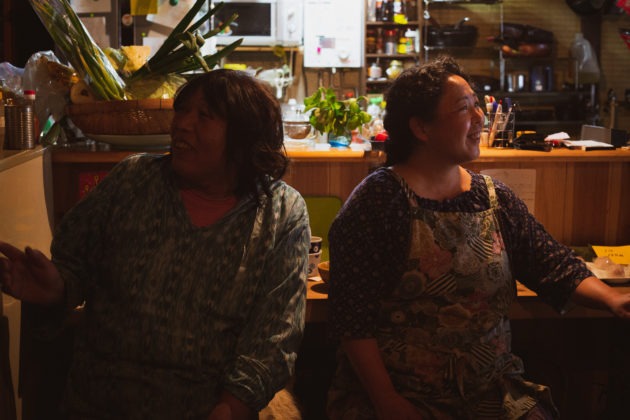
Do you think that is very rare? Is it unusual to find people who are just themselves?
No. But I think this is a place for those people. We understand that many of those people who want to act as themselves will come to this restaurant to meet friends. So that is the purpose of this restaurant.
To make friends with people who want to act as themselves.
Photography by Codi Hauka www.codihauka.com
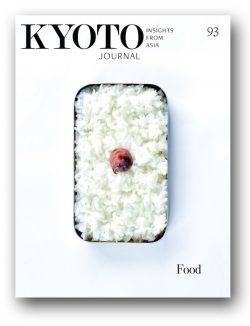

Photos by Codi Hauka www.codihauka.com